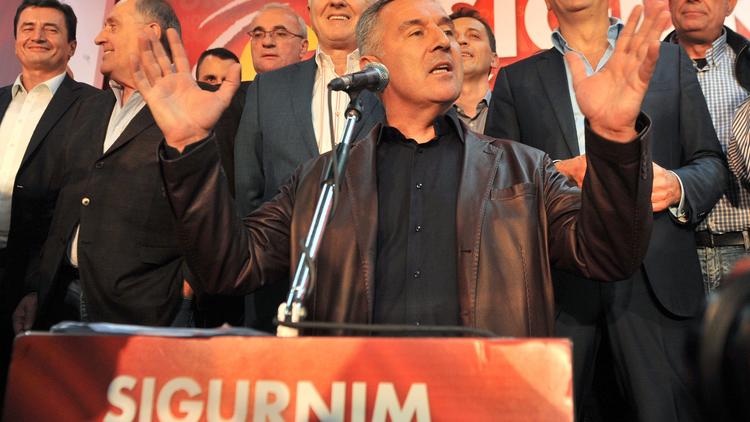By Olivera Komar (University of Montenegro)
On October 16th Montenegrins had an opportunity to vote at the tenth parliamentary elections since pluralism was officially introduced. Montenegrin Parliament consists of one chamber that includes 81 members. According to the preliminary results 387.765 people turned out to vote, which makes for a quite high turnout of 73.3%.
Out of 17 party lists that ran nine were successful in obtaining mandates. The most mandates were won by Democratic Party of Socialists DPS – 36 (41.4%), followed by the Democratic Front with 18 (20.2%), the Grand coalition Ključ (DEMOS, SNP and URA) – 9 (11%), the Democrats – 8 (9.9%), the Social Democratic Party – 4 (5.2%), the Bosniak’s Party – 2 (3.2%) and the Socialdemocrats – 2 (3.2%). Also, two ethnic political parties obtained mandates using special provisions of the Electoral law that lower the threshold for them – Albanians determinately (Forca, DUA, AA) – 1 mandate (1.2%) and Croatian Civic Initiative – 1 mandate (0.4%).
Even though drastic changes were announced by the opposition and apocalyptic scenarios were foreseen by the ruling party, not much new have actually happened. DPS will most probably continue to govern another four years with the support of traditional partners – ethnic minority parties (HGI and Bosniaks) and SDP “spin off” – Socialdemocrats. The new government composition might however introduce one interesting change – the new prime minister will probably not be Milo Đukanović, but current vice prime minister for political system, domestic and foreign policy – Duško Marković. This would be the third time that Đukanović tries to withdraw from the frontline of the politics (also in 2006 and 2010). Each time when DPS was in trouble he returned and ran the campaign almost alone. If he really stays out this time, it will probably be the end of DPS era as we know it.
So, going back to the elections, we could say that there were three main highlights:
DPS still controls the show even though with much more efforts than before
It is becoming obvious that DPS needs to put more efforts each time to secure the victory. This time, according to some witnesses, the pressure on the public administration and usual channels of soft coercion could have been compared to the Referendum in 2006. DPS employed all its resources and pushed as hard as ever but used them smartly. With some electoral engineering (borrowing own votes to ethnic HGI that has significantly lower threshold and partner Socialdemocrats) they barely made it. In order to secure the victory DPS employed all the usual instruments including the well-known “defense of Montenegrin independence” rhetoric. The final act of this performance was the alleged terrorist attack that was about to happen at the eve of Election Day and which rose the temperature. Whether that was a real threat or not (which is more likely) it helped the case that the country is in danger and that everyone should mobilize in its defense. Outrageous blocking of online communication tools (what s up and Viber) just before closing of the polls by the state Agency for telecommunications was the final part of this “state in danger” performance. But it worked. It was just enough to obtain the majority without a vote to spare.
Democratic front and DPS as perfect “frenemies”
Although the Democratic Front emerged as the largest opposition group and de facto the other pole of Montenegrin political spectrum it actually did a favor to DPS. With its flirting with Russian influence and anti-NATO politics, unexplainable enormous sums of money that were poured into campaign and demonstrations of power, it did raise the final count of its votes but at the expense of moderate opposition. Additionally it helped DPS’ case that the state is in danger and that it should be once again defended against external forces. Although the Democratic front’s campaign was largely about corruption, its strength, richness and scope raised suspicion about its source and that helped mobilizing traditionally pro Montenegrin votes for DPS. In situation of such high polarization Montenegrin main political cleavage which is unfortunately quasi ethnic – Montenegrins and others vs. Serbs, or independence vs. union with Serbia – deepens and breaks up like a grand canyon.
We still “mind the gap”
This cleavage can still not be bridged. The failure of the attempt to do so by the grand coalition Kljuc – one of the biggest losers of the elections – should teach us two lessons. The gap between Montenegrins and others on one side, and Serbs on the other is still very alive, and any attempts to overcome it by coalitions of pro Montenegrin and pro Serbian parties will not work. At least not by default. This brings us to a second lesson – no matter how good the idea you represent is, it will not gain support without serious ground fieldwork. Campaigns in Montenegro are pre-dominantly “door to door” and if you are not ready or you do not have resources to get your boots really dirty, you do not stand a chance. Kljuc just was not ready.
Regardless of the disappointment that these elections brought, one could think that we have some interesting times ahead. DPS is not a homogenous group but a platform of conflicted interests, groups and even clans. Djukanovic and its access to power kept it all together so it will be interesting to observe how the party could develop without him (if he really withdraws) especially in the situation where resources left for exploitation are becoming rather scarce and where the support is obviously diminishing. Unfortunately, it is probably more likely that any changes will be initiated by internal conflicts within DPS than by action of Montenegrin opposition.
Photo source: https://aboutcroatia.net/news/balkan/montenegro-election-dps-wins-35-seats-df-18-40622


